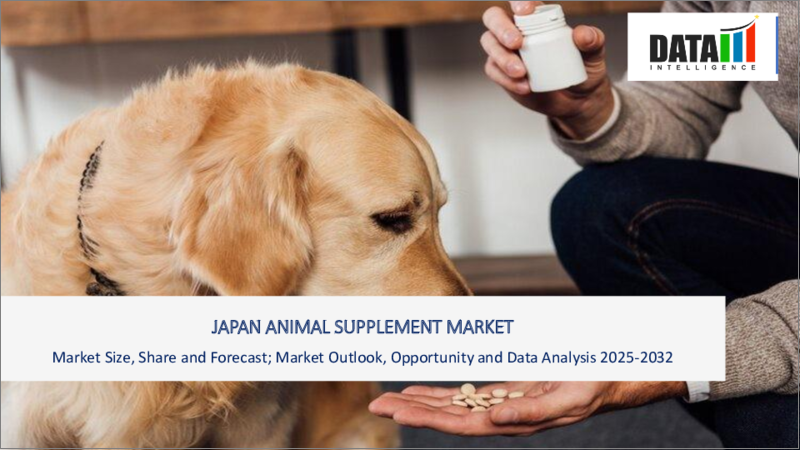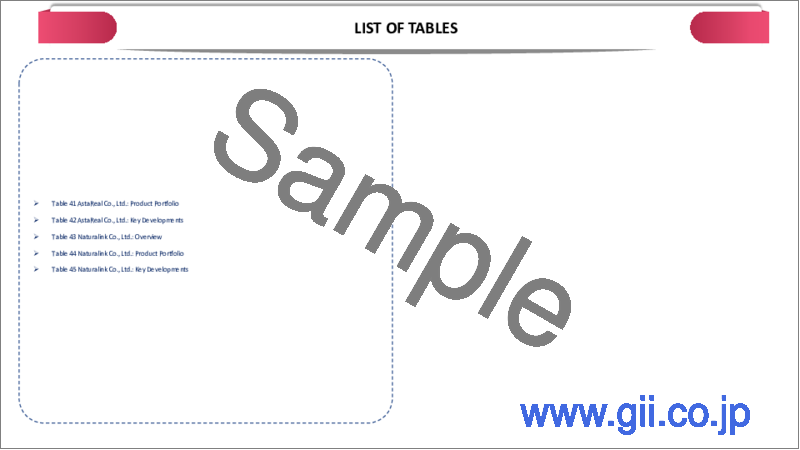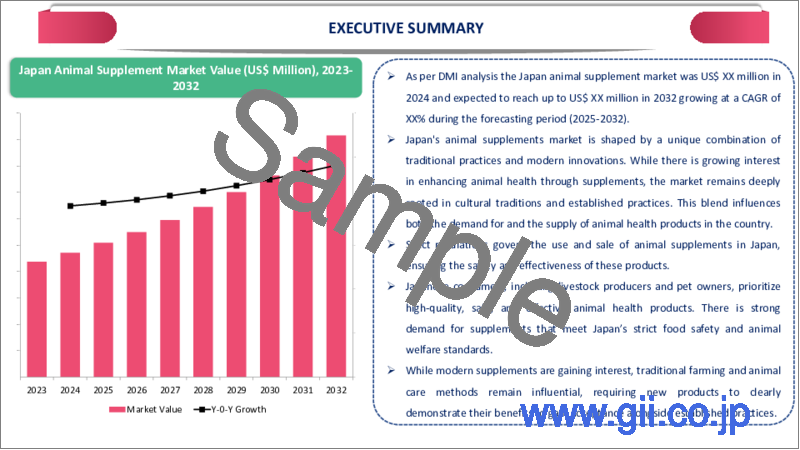|
|
市場調査レポート
商品コード
1560900
日本の動物用サプリメント市場:2024年~2027年Japan Animal Supplements Market - 2024-2027 |
||||||
カスタマイズ可能
適宜更新あり
|
|||||||
| 日本の動物用サプリメント市場:2024年~2027年 |
|
出版日: 2024年09月23日
発行: DataM Intelligence
ページ情報: 英文 198 Pages
納期: 即日から翌営業日
|
- 全表示
- 概要
- 目次
レポート概要
日本の動物用サプリメントの市場規模は、2023年に2億3,149万米ドルに達し、2027年には3億2,917万米ドルに達すると予測され、予測期間2024年~2027年のCAGRは9.48%で成長する見込みです。
日本の動物用サプリメント市場は、伝統的な慣行と近代的な進歩が融合しているのが特徴です。サプリメントを通じて動物の健康を増進することへの関心が高まっている一方で、市場は伝統的な手法と文化的慣行への強いこだわりによって形成されています。このユニークな融合は、日本における動物用サプリメントの需要と供給の両方に影響を及ぼしています。
日本には、動物用サプリメントの使用と販売に関する厳しい規制があります。これらの規制は、サプリメントの安全性と効能を確保することを目的としたもので、成分承認から製造慣行までをカバーしています。これらの規制を遵守するには、徹底した文書化と高品質基準の遵守が必要であり、市場力学に影響を与え、入手可能な製品の種類に影響を与えます。
畜産業者やペットの飼い主を含む日本の消費者は、高品質で安全かつ効果的な動物用健康食品を強く望んでいます。食品の安全性と動物福祉に関する日本の厳格な基準に沿ったサプリメントに対する需要は大きいです。加えて、伝統的な慣習や自然療法がいまだに根強く残っており、サプリメントがどのように受け止められ、採用されるかに影響を及ぼしています。
伝統的な農法や動物の飼育方法を重視する日本の文化は、近代的な動物用サプリメントの採用に影響を与えています。健康や生産性の向上といった利点を提供する新しいサプリメントへの関心が高まる一方で、伝統的な慣行は依然深く根付いています。このため、新製品が伝統的な方法と並んで受け入れられるには、明確な利点を示さなければならない市場となっています。
市場促進要因
ペットの人間化の進展
ペットを家族の一員とみなす傾向が強まり、ペットの健康とウェルネスへの投資が拡大しています。この動向は、ペットの長寿と生活の質をサポートする高品質のサプリメントに対する需要を牽引しています。例えば、高齢化と出生率の低下に直面している日本では、多くの日本人が子供よりもペットを好んでいます。
日本ペットフード協会によると、日本には16歳未満の子供が1,700万人しかいないのに、犬猫は2,000万匹近くいます。日本では、人々はペットにお金をかけ、とても大切にします。最高級のフードから、ワクチン接種の最新状況の確認、週末のツアーまで、日本のペットは親ができる最高の生活を与えられています。
実際、ペットはストレス解消に役立っています。これとは別にビジネスの側面もあります。日本では、顧客はお金を払って一定期間犬を飼うことができます。安全さえ保証すればいいのです。さらに、日本の消費者は健康と美容に強い関心を持っており、それはペットにも及んでいます。外見や健康全般を維持・向上させることに重きを置くこの文化は、ペットの被毛の状態や皮膚の健康、活力全般をサポートするサプリメントへの需要の高まりにつながります。
人間化の動向は、ペット用品の品質と安全性への期待の高まりにつながっています。日本のペットオーナーは高い基準で製造されたサプリメントを好み、天然成分や厳しい品質認証を満たした製品を求めることが多いです。さらに、人間化の動向は、高品質のサプリメントを幅広く提供するペット専門店やオンライン・プラットフォームの拡大を後押ししています。これらのチャネルは、プレミアムでカスタマイズされたペットの健康製品に対する需要の増加に対応しています。
家畜生産性の上昇
日本の畜産農場は、しばしば先進的農業技術の導入の最前線に立っています。こうした技術の利点を最大限に生かすため、サプリメントは家畜の健康を最適化し、飼料要求率を向上させ、全体的な生産性を高めるために使用されます。これによって、家畜が潜在的な生産力を最大限に発揮できるようになり、効率性と高品質の生産物を重視する国の姿勢と一致します。
生産性の向上に伴い、生産に影響を及ぼす可能性のある疾病を予防するため、家畜の健康を維持することがより重視されています。免疫系を強化し、腸内環境を改善し、全体的な健康をサポートするサプリメントは、病気の発生を予防し、安定した生産性を確保するために不可欠なものとなっています。
競争の激しい市場では、家畜の生産性を高めることが経済的リターンの向上につながります。成長率を高め、繁殖能力を向上させ、飼料コストを削減するサプリメントは、競争上の優位性をもたらし、収益性の最大化を目指す酪農家にとって価値ある投資となります。このように、家畜生産性の向上は市場の成長を後押しします。
例えば、日本は世界の飼料生産国のトップ10に入っています。オールテック(栄養会社)が最近実施した調査によると、2021年の日本の飼料生産量は全体で2,479万7,000トンに達しました。これは2019年のパンデミック前の数字、2,530万トンにほぼ匹敵しますが、一部のアナリストの当初の予測よりは若干低くなっています。
さらに、より高い生産性を求める動きは、サプリメント製剤の革新を促進します。日本の企業は、特定の生産性課題に対応する新しい改良型サプリメントを生み出すために研究開発に投資しており、市場成長に貢献しています。
市場抑制要因
動物の健康と製品に関する厳しい規制
動物用サプリメントに関する日本の厳しい規制要件を満たすためのコストは高額になる可能性があります。企業は、製品が安全性と有効性の基準に適合していることを確認するために、広範な試験、文書化、認証プロセスに投資しなければなりません。これは中小企業にとって特に負担が大きく、市場への参入や競争力を制限する可能性があります。
家畜の疾病予防と管理に関する規制は、動物用サプリメントの使用に影響を与える可能性があります。例えば、病気の予防に厳しい規則があれば、免疫機能や健康全般をサポートするサプリメントが不可欠になります。しかし、こうした規制を乗り越えるのは生産者にとって複雑でコストがかかるため、サプリメントへの投資意欲に影響を与える可能性があります。
例えば、毎年何千頭もの望まれない動物たちが、動物管理局によっていわゆる「ドリームボックス」に連れて行かれ、そこでガス処刑による非人道的な死に直面しています。このガス室は裏のビジネスではなく、野良犬や野良猫の問題に対処するために政府の公衆衛生局(保健所)によって認可されています。
日本には里親を探すためのシェルターがほとんどないため、誰かがペットを「保健所」が運営する「動物愛護センター」に引き渡した場合、そこがペットの行き着く先となるドリームボックスであることが多いです。ガスによる死はしばしば残酷なプロセスであり、異なるサイズの動物が同じガスにさらされるため、大きな動物は死ぬまでに30分かかることもあります。
このように、日本における動物生産に関連する厳しい規制は、動物用サプリメント市場の様々な側面に影響を及ぼす高度に管理された環境を作り出しています。こうした規制の遵守には多額の投資と適応が必要であり、利用可能なサプリメントの種類とその市場力学に影響を与えています。
市場セグメンテーション
日本の動物用サプリメント市場は、動物タイプ、成分、形態、流通チャネルに基づいて区分されます。
高品質の動物用製品への需要がセグメント成長を牽引
2024年~2027年の予測期間中、畜産動物セグメントが市場の76.21%以上を占め、優位を占めると予想されます。日本は高品質の畜産物、特に和牛などの牛肉、酪農、鶏肉産業で知られています。高級基準を維持するため、畜産農家は動物の栄養、健康、福祉に重点を置いています。ビタミン、ミネラル、プロバイオティクス、飼料添加物などのサプリメントは、畜産物の生産性、成長率、品質を向上させるために不可欠です。
例えば、和牛農家は、肉の霜降りと柔らかさを向上させ、厳しい品質基準を満たすようにするため、特にオメガ3脂肪酸のような特定の動物用サプリメントをよく使用します。
日本の畜産業は、鳥インフルエンザや口蹄疫など、畜産業に壊滅的打撃を与えかねない疾病の発生に敏感です。サプリメントは、免疫力を高め、抗生物質の必要性を減らすという重要な役割を果たし、動物の健康を維持し、抗生物質不使用の生産に対する需要の高まりに対応するために極めて重要です。例えば、酪農家は牛の感染症を予防するためにプロバイオティクスや免疫強化サプリメントを使用し、その結果、牛群がより健康になり、乳量も増加します。
持続可能性分析
日本の動物用サプリメント市場では、環境にやさしい農法と効率的な資源利用の必要性によって、持続可能性がますます重要な要素となっています。さらに、日本の動物用サプリメント市場の持続可能性は、環境問題、食糧安全保障、動物福祉に起因して、ますます重要性を増しています。
サプリメントを通じて飼料の効率を向上させることは、廃棄物や環境への影響を削減します。これは、農地が限られ、飼料の多くを輸入に頼っている日本では特に重要です。酵素、アミノ酸、プロバイオティクスなどのサプリメントは、家畜が飼料をより効果的に消化するのを助け、廃棄物の削減と排出量の削減につながります。
例えば、味の素は家畜の栄養吸収を最適化するアミノ酸ベースの製品を開発し、飼料の無駄を減らしながら成長を促進しています。これにより、全体的な資源効率が向上し、畜産における二酸化炭素排出量が削減されます。味の素は、二酸化炭素排出量の削減や、それとは無関係のサプライチェーンにおける生産性向上のために、この副産物を利用しています。家畜、特に牛は、強力な温室効果ガスであるメタン排出の大きな原因となっています。企業はメタン排出を削減するサプリメントを開発し、日本の持続可能性と環境目標の達成に貢献しています。
抗菌剤耐性への懸念から、抗生物質不使用の畜産物への需要が高まっています。免疫力、腸内環境、健康全般を向上させるサプリメントは、畜産における抗生物質の必要性を減らし、より倫理的で持続可能な家畜管理を促進します。例えば、出光興産は家畜の生産性を向上させ、健康を維持し、畜産物の収量と品質を維持するための製品を開発しています。このアプローチは抗生物質への依存を減らし、倫理的で持続可能な農業の実践に合致しています。
アンメットニーズ
動物用サプリメントが入手しやすくなっているにもかかわらず、個々の家畜の特定の健康ニーズに合わせた、真に個別化された製品には大きな隔たりがあります。現在のところ、ほとんどのサプリメントは画一的なアプローチで提供されており、ユニークな健康プロファイルや遺伝的素因を持つ動物には効果的でないかもしれません。
日本では数多くの動物用サプリメントが販売されていますが、多くの製品はその有効性と安全性を裏付ける確固たる科学的根拠を欠いています。消費者と獣医の専門家は、厳密な臨床研究とエビデンスに裏打ちされたサプリメントをますます求めるようになっています。現在、サプリメント市場は、サプリメントメーカーの主張を検証する、十分に文書化された研究や臨床試験の不足に苦しんでいます。信頼を築き、サプリメントがその約束を果たすことを確実にするために、詳細な科学的検証を伴う、より調査主導型の製品が求められていることは明らかです。
予防医療は、現在のサプリメントがしばしば不足しがちな分野です。多くの製品が既存の症状を治療するために設計されている一方で、総合的な健康を積極的にサポートし、病気になる前に予防するサプリメントに対するニーズはかなり満たされていません。例えば、免疫機能を強化したり、代謝の最適化をサポートしたり、認知機能の長寿を促進したりするサプリメントが、このギャップを埋める可能性があります。また、食事や運動など、より広範な健康管理戦略と統合することで、予防医療への総合的なアプローチを提供する製品も必要とされています。
特に小規模農家やペットの飼い主にとっては、コストが高品質の動物用サプリメントを入手する際の障壁となる可能性があります。手頃な価格でありながら、品質に妥協のない効果的なサプリメントに対するアンメットニーズが存在します。製造プロセス、原料調達、流通における革新は、製品の有効性を維持しながらコストを削減するのに役立つ可能性があります。
市場競合情勢
日本市場における世界の主要企業には、万田発酵株式会社、株式会社ディーエイチシー、東栄新薬株式会社、株式会社アイシア、アスタリアル株式会社などが含まれます。
主な発展
2022年8月、東栄新薬はKA21サプリメント「アガリクス茸」の越境ECサイトを開設しました。東栄新薬は以前から、免疫力アップ、育毛、ダイエット、腸内環境改善などの目的で、アガリクス茸、KA21を配合した商品を世界各国から購入しています。また、ペット用サプリメントなども販売し、個人の要望に応えています。
レポート購入の理由
日本の動物用サプリメント市場が動物タイプ、成分、形態、流通チャネルに基づいて細分化され、主要な商業資産と企業を理解できます。
動向と共同開発を分析することで、商機を見極められます。
日本の動物用サプリメント市場レベルの全セグメントを網羅した多数のデータを収録したExcelデータシート
徹底的な定性インタビューと綿密な調査によって包括的に分析されたPDFレポート
主要企業の主要製品のExcelによる製品マッピング
日本の動物用サプリメント市場レポートは、約27表、33図、198ページを提供します。
対象読者:2024年
メーカー/バイヤー
業界投資家/投資銀行家
調査専門家
新興企業
目次
第1章 調査手法と調査範囲
第2章 定義と概要
第3章 エグゼクティブサマリー
第4章 市場力学
- 影響要因
- 促進要因
- ペットの人間化の進展
- 畜産生産性の上昇
- 抑制要因
- 動物の健康と製品に関する厳しい規制
- 機会
- 影響分析
- 促進要因
第5章 産業分析
- ポーターのファイブフォース分析
- サプライチェーン分析
- 価格分析
- 規制分析
- DMI見解
第6章 動物タイプ別
- 畜産動物
- 家畜
- 家禽
- 豚
- 馬
- その他
- ペット
- 犬
- 猫
- 鳥類
- その他の小型哺乳類
第7章 成分別
- ビタミン・ミネラル
- アミノ酸
- オメガ脂肪酸
- プロバイオティクスとプレバイオティクス
- 植物性食品
- その他
第8章 形態別
- 粉末
- 液体
- 錠剤/カプセル
- 注射剤
第9章 流通チャネル別
- オンライン小売業者
- ペット専門店
- 動物病院
- コンビニエンスストア
- スーパーマーケット/ハイパーマーケット
- 薬局・ドラッグストア
- その他の流通チャネル
第10章 持続可能性分析
- 環境分析
- 経済分析
- ガバナンス分析
第11章 競合情勢
- 競合シナリオ
- 市況/シェア分析
- M&A分析
第12章 企業プロファイル
- Manda Fermentation Co., Ltd.
- 会社概要
- 製品ポートフォリオと概要
- 財務概要
- 主な発展
- DHC Corporation
- TOEI SHINYAKU Co., Ltd.
- AIXIA Corporation
- AstaReal Co., Ltd.
第13章 付録
Report Overview
Japan Animal Supplement Market reached US$ 231.49 million in 2023 and is expected to reach US$ 329.17 million by 2027, growing with a CAGR of 9.48% during the forecast period 2024-2027.
Japan's animal supplements market is characterized by a blend of traditional practices and modern advancements. While there is a growing interest in enhancing animal health through supplements, the market is shaped by a strong adherence to traditional methods and cultural practices. This unique blend influences both the supply and demand for animal supplements in the country.
Japan has stringent regulations governing the use and sale of animal supplements. These regulations are designed to ensure the safety and efficacy of supplements, covering aspects from ingredient approval to manufacturing practices. Compliance with these regulations requires thorough documentation and adherence to high-quality standards, impacting market dynamics and influencing the types of products available.
Japanese consumers, including livestock producers and pet owners, strongly prefer high-quality, safe and effective animal health products. There is significant demand for supplements that align with Japan's rigorous standards for food safety and animal welfare. Additionally, traditional practices and natural remedies still hold sway, influencing how supplements are perceived and adopted.
Japan's cultural emphasis on traditional farming and animal care methods impacts the adoption of modern animal supplements. While increasing interest in new supplements offering benefits such as improved health and productivity, traditional practices remain deeply embedded. This creates a market where new products must demonstrate clear advantages to gain acceptance alongside traditional methods.
Market Drivers
Increasing Humanization of Pets
Pets are increasingly viewed as family members, leading to greater investment in their health and wellness. This trend drives demand for high-quality supplements that support pet longevity and quality of life. For instance, in a country that is dealing with an aging population and a plummeting birth rate, many Japanese people favor pets over children.
According to the Japan Pet Food Association, the country has just 17 million children under the age of 16, yet almost 20 million cats and dogs. In Japan, people splurge on their pets and take excellent care of them. From top-quality food to making sure their vaccination status is up-to-date, to tours on weekends, pets in Japan are given the best life that their parents can afford.
In fact, pets help in relieving stress. There is a separate business aspect of this as well. In Japan, a client can pay to keep dogs for a period of time. They only need to guarantee their safety. Additionally, Japanese consumers have a strong focus on health and beauty, which extends to their pets. This cultural emphasis on maintaining and enhancing physical appearance and overall health translates into a higher demand for supplements that support pets' coat condition, skin health and general vitality.
The humanization trend has led to increased expectations for the quality and safety of pet products. Japanese pet owners prefer supplements that are manufactured to high standards, often seeking out products with natural ingredients and those that meet rigorous quality certifications. Moreover, the humanization trend has driven the expansion of specialty pet stores and online platforms that offer a wide range of high-quality supplements. These channels cater to the increasing demand for premium and customized pet health products.
Rising Livestock Productivity
Japanese livestock farms are often at the forefront of adopting advanced agricultural technologies. To maximize the benefits of these technologies, supplements are used to optimize animal health, improve feed conversion rates and enhance overall productivity. This ensures that livestock can achieve their full potential in productivity, aligning with the country's emphasis on efficiency and high-quality output.
With rising productivity, there is a greater emphasis on maintaining animal health to prevent diseases that could impact production. Supplements that boost the immune system, improve gut health and support overall well-being become essential in preventing disease outbreaks and ensuring consistent productivity.
In a competitive market, increasing livestock productivity can lead to better economic returns. Supplements that enhance growth rates, improve reproductive performance, or reduce feed costs can provide a competitive edge, making them a valuable investment for farmers aiming to maximize profitability. Thus, rise of livestock productivity helps to boost the market growth.
For instance, Japan is in the top 10 of global animal feed producers. According to a recent survey, conducted by Alltech (nutrition company), in 2021 the overall volume of animal feed production in the country amounted to 24.797 million tons. This is almost comparable to the pre-pandemic figures of 2019, 25.3 million tons, however slightly lower than some initial analysts' predictions.
Moreover, the drive for higher productivity fosters innovation in supplement formulations. Companies in Japan are investing in research and development to create new and improved supplements that address specific productivity challenges, contributing to market growth.
Market Restraints
Stringent Regulations Regarding Animal Health and Products
The cost of meeting Japan's strict regulatory requirements for animal supplements can be high. Companies must invest in extensive testing, documentation and certification processes to ensure their products comply with safety and efficacy standards. This can be particularly burdensome for small and medium-sized enterprises, potentially limiting their ability to enter or compete in the market.
Regulations related to disease prevention and control in livestock can impact the use of animal supplements. For example, if there are stringent rules for preventing diseases, supplements that support immune function or overall health become essential. However, navigating these regulations can be complex and costly for producers, potentially affecting their willingness to invest in supplements.
For instance, each year thousands of these unwanted animals are taken by animal control to so-called "dream boxes", where they face an inhumane death by gassing. These gas chambers are not back-alley businesses but are sanctioned by the government Department of Public Health ("hokensho") to deal with the stray dog and cat problem.
And it's not just the strays rounded up on the street that are sent here; Japan has very few rehoming shelters, so when someone hands their pet over to a "hokensho"-run "animal welfare center," it's often the dream boxes where they'll end up. Death by gassing is often a cruel process, with different-sized animals being given the same gas exposure, meaning that the larger animals may take up to 30 minutes to die.
Thus, stringent regulations related to animal production in Japan create a highly controlled environment that affects various aspects of the animal supplements market. Compliance with these regulations involves significant investment and adaptation, influencing the types of supplements available and their market dynamics.
Market Segment Analysis
The Japan animal supplement market is segmented based on animal type, ingredient, form and distribution channel.
Demand for High-Quality Animal Products Drives the Segment Growth
The livestock animal segment is expected to dominate with over 76.21% of the market during the forecast period 2024-2027. Japan is known for its high-quality animal products, especially in the beef like Wagyu beef, dairy and poultry industries. To maintain premium standards, livestock farmers focus heavily on animal nutrition, health and welfare. Supplements like vitamins, minerals, probiotics and feed additives are essential for improving the productivity, growth rates and quality of animal products.
For instance, Wagyu beef farmers often use specific animal supplements such as omega-3 fatty acids especially to improve the marbling and tenderness of the meat, ensuring it meets strict quality standards, this may further boost the segment growth.
Livestock farming in Japan is sensitive to disease outbreaks that could devastate the sector, such as avian influenza or foot-and-mouth disease. Supplements play a vital role in enhancing immunity and reducing the need for antibiotics, crucial for maintaining animal health and complying with rising demands for antibiotic-free production. Like, dairy farmers use probiotics and immune-boosting supplements to prevent infections in cattle, resulting in healthier herds and higher milk yields.
Sustainability Analysis
Sustainability is an increasingly important factor in the Japanese animal supplements market, driven by the need for environmentally friendly farming practices and efficient resource use. Additionally, the sustainability of the animal supplements market in Japan is becoming increasingly important due to environmental concerns, food security and animal welfare.
Improving the efficiency of feed through supplements reduces waste and environmental impact. This is especially important in Japan, where agricultural land is limited and much of the feed is imported. Supplements like enzymes, amino acids and probiotics help livestock digest feed more effectively, leading to less waste and lower emissions.
For instance, Ajinomoto has developed amino acid-based products that optimize nutrient absorption in livestock, enhancing growth while reducing feed waste. This improves overall resource efficiency and lowers the carbon footprint of livestock farming. Ajinomoto has been using the co-product to reduce carbon emissions or improve productivity in supply chains that are unrelated to it. Livestock, particularly cattle, are significant contributors to methane emissions, a potent greenhouse gas. Companies are innovating supplements that reduce methane emissions, helping Japan meet its sustainability and environmental targets.
There is a growing demand for antibiotic-free livestock products due to concerns about antimicrobial resistance. Supplements that enhance immunity, gut health and overall wellness reduce the need for antibiotics in animal farming, promoting more ethical and sustainable livestock management. For instance, Idemitsu Kosan develops products that help improve livestock productivity and maintain health, as well as maintain the yield and quality of livestock products. This approach reduces dependency on antibiotics, aligning with ethical and sustainable farming practices.
Unmet Needs
Despite the increasing availability of animal supplements, there remains a significant gap in truly personalized products tailored to individual animals' specific health needs. Currently, most supplements offer a one-size-fits-all approach, which may not be effective for animals with unique health profiles or genetic predispositions.
While there are numerous animal supplements available in Japan, many products lack robust scientific evidence supporting their efficacy and safety. Consumers and veterinary professionals are increasingly seeking supplements that are backed by rigorous clinical research and evidence. The market currently suffers from a shortage of well-documented studies and clinical trials that validate the claims made by supplement manufacturers. There is a clear need for more research-driven products, with detailed scientific validation to build trust and ensure that supplements deliver on their promises.
Preventive health is an area where current supplements often fall short. While many products are designed to treat existing conditions, there is a significant unmet need for supplements that proactively support overall health and prevent diseases before they occur. For instance, supplements that enhance immune function, support optimal metabolic health, or promote cognitive longevity could fill this gap. There is also a need for products that integrate with broader health management strategies, such as diet and exercise, to offer a holistic approach to preventive care.
Cost can be a barrier to accessing high-quality animal supplements, particularly for small-scale farmers and pet owners. There is an unmet need for affordable yet effective supplement options that do not compromise on quality. Innovations in manufacturing processes, ingredient sourcing and distribution could help reduce costs while maintaining product efficacy.
Market Competitive Landscape
The major global players in the Japan market include Manda Fermentation Co., Ltd., DHC Corporation, TOEI SHINYAKU Co., Ltd., AIXIA Corporation, AstaReal Co., Ltd. and among others.
By Animal Type
Livestock Animals
Cattle
Poultry
Swine
Horses
Others
Companion Animals
Dogs
Cats
Birds
Other Small Mammals
By Ingredient
Vitamins & Minerals
Amino Acids
Omega Fatty Acids
Probiotics & Prebiotics
Botanicals
Others
By Form
Powder
Liquid
Tablets/Capsules
Injections
By Distribution Channel
Online Retailers
Specialty Pet Stores
Veterinary Clinics
Convenience Stores
Supermarkets/Hypermarkets
Pharmacies and Drug Stores
Other Distribution Channels
Key Developments
In August 2022, Toei Shinyaku launched a cross-border EC website for Agaricus blazei, a KA21 supplement. Customers from around the world have been purchasing Toei Shinyaku products for some time now; including products containing Agaricus blazei, KA21 for boosting immunity, hair growth, dieting and improvement of the intestinal environment. They have also sold pet supplements, etc. to meet individual requests.
Why Purchase the Report?
To visualize the Japan animal supplement market segmentation based on animal type, ingredient, form and distribution channel, as well as understand key commercial assets and players.
Identify commercial opportunities by analyzing trends and co-development.
Excel data sheet with numerous data points of the Japan animal supplement market-level with all segments.
PDF report consists of a comprehensive analysis after exhaustive qualitative interviews and an in-depth study.
Product mapping available as excel consisting of key products of all the major players.
The Japan animal supplement market report would provide approximately 27 tables, 33 figures and 198 pages.
Target Audience 2024
Manufacturers/ Buyers
Industry Investors/Investment Bankers
Research Professionals
Emerging Companies
Table of Contents
1. Methodology and Scope
- 1.1. Research Methodology
- 1.2. Research Objective and Scope of the Report
2. Definition and Overview
3. Executive Summary
- 3.1. Snippet by Animal Type
- 3.2. Snippet by Ingredient
- 3.3. Snippet by Form
- 3.4. Snippet by Distribution Channel
4. Dynamics
- 4.1. Impacting Factors
- 4.1.1. Drivers
- 4.1.1.1. Increasing Humanization of Pets
- 4.1.1.2. Rising Livestock Productivity
- 4.1.2. Restraints
- 4.1.2.1. Stringent Regulations Regarding Animal Health and Products
- 4.1.3. Opportunity
- 4.1.4. Impact Analysis
- 4.1.1. Drivers
5. Industry Analysis
- 5.1. Porter's Five Force Analysis
- 5.2. Supply Chain Analysis
- 5.3. Pricing Analysis
- 5.4. Regulatory Analysis
- 5.5. DMI Opinion
6. By Animal Type
- 6.1. Introduction
- 6.1.1. Market Size Analysis and Y-o-Y Growth Analysis (%), By Animal Type
- 6.1.2. Market Attractiveness Index, By Animal Type
- 6.2. Livestock Animals*
- 6.2.1. Introduction
- 6.2.2. Market Size Analysis and Y-o-Y Growth Analysis (%)
- 6.2.3. Cattle
- 6.2.4. Poultry
- 6.2.5. Swine
- 6.2.6. Horses
- 6.2.7. Others
- 6.3. Companion Animals
- 6.3.1. Dogs
- 6.3.2. Cats
- 6.3.3. Birds
- 6.3.4. Other Small Mammals
7. By Ingredient
- 7.1. Introduction
- 7.1.1. Market Size Analysis and Y-o-Y Growth Analysis (%), By Ingredient
- 7.1.2. Market Attractiveness Index, By Ingredient
- 7.2. Vitamins & Minerals*
- 7.2.1. Introduction
- 7.2.2. Market Size Analysis and Y-o-Y Growth Analysis (%)
- 7.3. Amino Acids
- 7.4. Omega Fatty Acids
- 7.5. Probiotics & Prebiotics
- 7.6. Botanicals
- 7.7. Others
8. Form
- 8.1. Introduction
- 8.1.1. Market Size Analysis and Y-o-Y Growth Analysis (%), By Form
- 8.1.2. Market Attractiveness Index, By Form
- 8.2. Powder*
- 8.2.1. Introduction
- 8.2.2. Market Size Analysis and Y-o-Y Growth Analysis (%)
- 8.3. Liquid
- 8.4. Tablets/Capsules
- 8.5. Injections
9. Distribution Channel
- 9.1. Introduction
- 9.1.1. Market Size Analysis and Y-o-Y Growth Analysis (%), By Distribution Channel
- 9.1.2. Market Attractiveness Index, By Distribution Channel
- 9.2. Online Retailers*
- 9.2.1. Introduction
- 9.2.2. Market Size Analysis and Y-o-Y Growth Analysis (%)
- 9.3. Specialty Pet Stores
- 9.4. Veterinary Clinics
- 9.5. Convenience Stores
- 9.6. Supermarkets/Hypermarkets
- 9.7. Pharmacies and Drug Stores
- 9.8. Other Distribution Channels
10. Sustainability Analysis
- 10.1. Environmental Analysis
- 10.2. Economic Analysis
- 10.3. Governance Analysis
11. Competitive Landscape
- 11.1. Competitive Scenario
- 11.2. Market Positioning/Share Analysis
- 11.3. Mergers and Acquisitions Analysis
12. Company Profiles
- 12.1. Manda Fermentation Co., Ltd.*
- 12.1.1. Company Overview
- 12.1.2. Type Portfolio and Description
- 12.1.3. Financial Overview
- 12.1.4. Key Developments
- 12.2. DHC Corporation
- 12.3. TOEI SHINYAKU Co., Ltd.
- 12.4. AIXIA Corporation
- 12.5. AstaReal Co., Ltd. (*LIST NOT EXHAUSTIVE)
13. Appendix
- 13.1. About Us and Services
- 13.2. Contact Us






